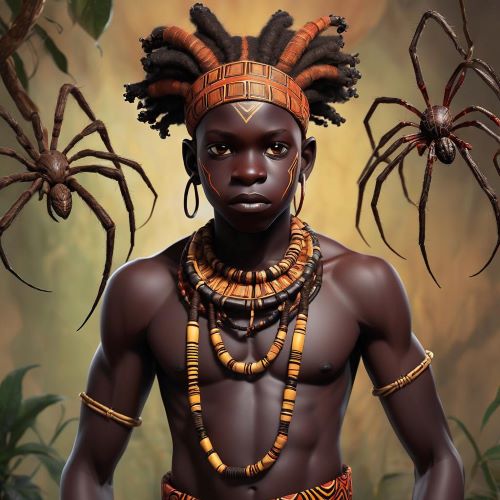Akan Mortals
Akan Mortals in mythology play a vital role in preserving the cultural identity and ancestral values of the Akan people of West Africa. These legendary humans—often portrayed as wise leaders, brave warriors, cunning tricksters, or revered ancestors—are central to the oral traditions of the Akan, which include the Ashanti, Fante, and Akuapem groups. Unlike gods or spirits, Akan Mortals are deeply relatable figures whose human experiences offer moral guidance, historical insight, and a reflection of everyday struggles within the community.
These mortal characters are often celebrated in proverbs, folktales, and historical narratives passed down through generations. One of the most iconic figures is Ananse, the clever spider who is sometimes portrayed as a mortal and sometimes as a trickster spirit. His stories, which blend humor with life lessons, emphasize intelligence over strength and the value of wit in overcoming adversity. Other mortal figures include founding chiefs, queens, and warriors whose actions helped establish clans, resolve conflicts, or protect the people in times of war and hardship.
Akan Mortals often serve as moral exemplars or cautionary tales. Their stories reflect values such as respect for elders, loyalty to family, community cooperation, and reverence for tradition. These narratives not only teach children how to navigate the world but also reinforce societal expectations and taboos. The actions of these mortals frequently carry spiritual significance, as many are believed to become revered ancestors with influence over the living through the ancestral realm, a core belief in Akan cosmology.
The legacy of Akan Mortals is also closely tied to the sacred connection between people and the land. Mortals are often associated with specific towns, rivers, or royal lineages, linking the stories to real-world geography and historical events. Shrines and sacred sites honoring these individuals can still be found in Akan regions, where rituals are performed to honor their spirits and seek guidance. These figures bridge the gap between the historical and the mythical, often blurring the line between human achievement and divine favor.
Today, the stories of Akan Mortals continue to resonate through festivals, storytelling performances, and cultural education programs. As the Akan diaspora grows and interest in African heritage deepens, these characters serve as powerful links to the past. Their lives and lessons offer insight into the values and worldviews of the Akan people, making them essential figures in the preservation of cultural knowledge. From the cunning of Ananse to the courage of legendary warriors, Akan Mortals remain vibrant symbols of human strength, wisdom, and resilience in African mythology.
Akan Mortals in mythology play a vital role in preserving the cultural identity and ancestral values of the Akan people of West Africa. These legendary humans—often portrayed as wise leaders, brave warriors, cunning tricksters, or revered ancestors—are central to the oral traditions of the Akan, which include the Ashanti, Fante, and Akuapem groups. Unlike gods or spirits, Akan Mortals are deeply relatable figures whose human experiences offer moral guidance, historical insight, and a reflection of everyday struggles within the community.
These mortal characters are often celebrated in proverbs, folktales, and historical narratives passed down through generations. One of the most iconic figures is Ananse, the clever spider who is sometimes portrayed as a mortal and sometimes as a trickster spirit. His stories, which blend humor with life lessons, emphasize intelligence over strength and the value of wit in overcoming adversity. Other mortal figures include founding chiefs, queens, and warriors whose actions helped establish clans, resolve conflicts, or protect the people in times of war and hardship.
Akan Mortals often serve as moral exemplars or cautionary tales. Their stories reflect values such as respect for elders, loyalty to family, community cooperation, and reverence for tradition. These narratives not only teach children how to navigate the world but also reinforce societal expectations and taboos. The actions of these mortals frequently carry spiritual significance, as many are believed to become revered ancestors with influence over the living through the ancestral realm, a core belief in Akan cosmology.
The legacy of Akan Mortals is also closely tied to the sacred connection between people and the land. Mortals are often associated with specific towns, rivers, or royal lineages, linking the stories to real-world geography and historical events. Shrines and sacred sites honoring these individuals can still be found in Akan regions, where rituals are performed to honor their spirits and seek guidance. These figures bridge the gap between the historical and the mythical, often blurring the line between human achievement and divine favor.
Today, the stories of Akan Mortals continue to resonate through festivals, storytelling performances, and cultural education programs. As the Akan diaspora grows and interest in African heritage deepens, these characters serve as powerful links to the past. Their lives and lessons offer insight into the values and worldviews of the Akan people, making them essential figures in the preservation of cultural knowledge. From the cunning of Ananse to the courage of legendary warriors, Akan Mortals remain vibrant symbols of human strength, wisdom, and resilience in African mythology.

